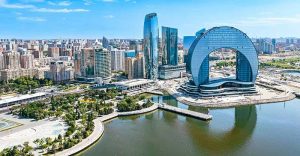At COP29, scheduled to be held in Baku in November 2024, Azerbaijan will call for a global ceasefire, Elnur Soltanov, Deputy Minister of Energy of Azerbaijan and CEO of COP29, said in an interview with Anadolu Agency.

Soltanov stated that climate change will be the main focus of COP29: “Developed countries will also show more support to developing countries, which will be on the agenda of COP29. Climate change affects Africa the most.”
The CEO noted that Armenia has also been invited to COP29: “We will have approximately 80,000 guests. Invitations have been sent to all the presidents of the world. Ministers from more than 50 countries will attend, and this number is expected to increase.”
“COP29 will be an event unlike any other hosted by Azerbaijan. We will lead the climate debate and showcase Azerbaijan’s hospitality. COP is unlikely to fail,” he said.
Dr. Nariman Pashayev, head of the Department of Economics and Geography at the Institute of Geography, in an interview, emphasised that Azerbaijan must take substantial measures to combat climate change.
“Global climate change affects people’s lives and economic activities. If drought occurs in one area, floods, landslides, and mudslides happen in another. People try to adapt to these changes, but currently, there is a global drought prevailing worldwide,” stated Dr. Pashayev.
He believes that hosting COP29 in Azerbaijan can boost efforts to address climate change. “The COP event, previously held in various countries, will take place in Azerbaijan this November. Until now, developed countries have been fighting climate change, and we started in 2015. COP29 is of great importance for Azerbaijan as it can increase attention to processes such as soil protection, restoration of geological diversity, and creation of water basins, ultimately enhancing people’s care for the environment,” he added.
The geographer noted that the consequences of climate change are clearly visible in Azerbaijan. “The greatest impact has been around the Caspian Sea, where the sea has receded by at least 200 meters from Samur River to Astara River, with some areas experiencing a 300-meter retreat. The effects of drought are evident in Azerbaijan, and the water level in the Kura River has also decreased, although this year’s heavy rainfall has slightly increased the water level,” he explained.
Dr. Pashayev emphasised the need to adhere to the provisions of the Paris Agreement, with the main goal being to keep the 1.5°C target within reach and not to overlook any country, especially COP participating countries.
“The environment is extremely polluted, causing rising temperatures. Glaciers in the Arctic, Antarctic, and Caucasus are already melting. The Paris Agreement is crucial for Azerbaijan, as every piece of waste and carbon emission hinders longevity. Countries must understand that the world is united, and everyone should protect their territory with care, fighting pollution together. So far, 28 such conferences have been held. Now it is held in Azerbaijan.
“COP measures show that everyone should protect their territory with care. There should be a joint fight against pollution. We have also supported the Paris Agreement and took obligation in this regard. By 2030, we must reduce pollution and the amount of waste. This reduction should be achieved by at least 35 percent. These are massive issues. They take long research and hard work,” he stressed.
The department head also highlighted that one of COP29’s most significant achievements will be the transition to alternative energy. “Azerbaijan heavily relies on oil and gas, while some countries use coal. However, these resources are depleting, necessitating a shift to alternative energy sources such as solar, wind, water, and tidal energy, which are clean and inexhaustible. Azerbaijan has committed to using 30% alternative energy by 2030, currently at 7-10%, with the potential to increase it to 80% in Nakhchivan and Karabakh,” he noted.
Dr. Pashayev emphasised that increasing the number of recycling plants in Azerbaijan is essential to reduce pollution and maintain a stable global temperature. “All production facilities should minimise waste discharged into the environment, and extensive training should be provided. Baku has only one waste recycling plant, while valuable raw materials are discarded daily. Each region should have at least one waste recycling plant to meet our needs. Thanks to those plants, waste must be reprocessed. In this regard, COP29 will create the foundation for the creation of new jobs worldwide,” he concluded.
